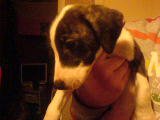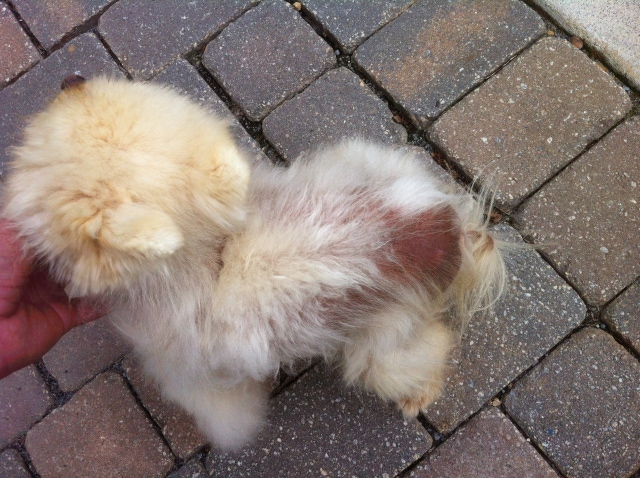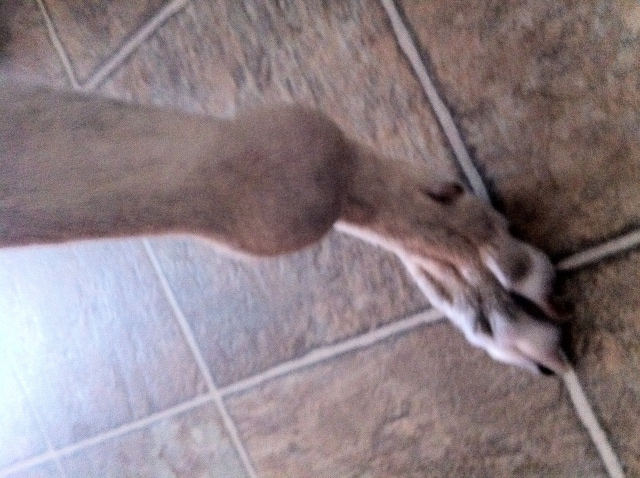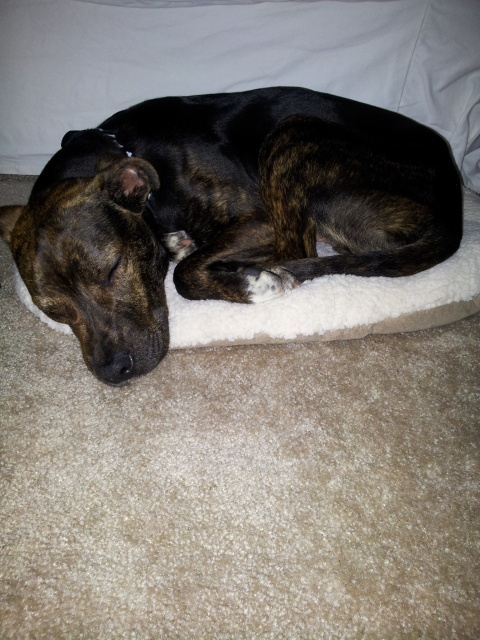QuestionHi and thanking for trying to help out.
I am really concerned, we have a adult shitzu dog which we have had for many years, is name is Sampson, he is about 5 years old. His nature, is playful, loveable, happy and loves to play, we thought for many months whether to get another purebred shitzu, we decided and he was introduced into the home yesterday, I am really concerned and the new puppy Storm seems to want to play with the older dog, but the older dog is not interested and either ignores the little one and for some reason seems a litttle scared by him. It is hurting me terribly at the moment as the little pup is taking over the area (ie last night we put them in seperate beds in laundry (making sure big dog had his bed) - I awake this morning and and the puppy has taken the big dogs bed, I am really worried as Sampson (older dog) seems withdrawn and sad - so not his nature!!! while the little puppy is whining and wants thinks done without respect for the other dog - the little pup is 8 weeks old.
Please help!! - what can I do to make this work, as it would be devestating if these two dogs to not want to be with each other, the introduction yesterday was ok, the older dog sniffed him a little (he is not de-sexed) - they are both males.
By the way the puppy is peeing all over the laundry - I want this to work but I must admit I am finding this hard and now am a little resentful to the puppy for making Sampson upset... any help would be really appreciated.
Lina - Australia
AnswerOnce past 3 years old, many dogs don't want anything to do with puppies, their sharp little teeth, and their biting games. You need to teach the puppy to leave the older dog alone. As soon as the puppy starts to focus on the older dog, give it a sharp ''Ah, ah, ah!'' and offer it a chew toy.
A crate would solve several problems including the old dog's bed.
Much of housebreaking is not training the puppy, but making it easier for your puppy, you, and your carpet while its body to catches up to its instincts. At around 8 weeks when the puppy goes to its new home, the time from when it realizes it has to go, and when it can't wait any longer is a matter of seconds. Only time will fix that. You can hardly be expected to be attentive enough to avoid all accidents. There is no sense punishing the puppy for your inattention. It is not fair to punish you either, but you still have to clean it up if you didn't have the puppy outside in time.
Housebreaking starts before you get home with the new puppy. If you don't have a crate, buy one. I prefer the more enclosed, den like plastic ones. Skip the bedding. At first it gets wet, and later it can be chewed into choking hazards. A wire grid in the bottom will help keep the puppy up out of accidents at first. They are available with the crates, but expensive and hard to find. A piece of closely spaced wire closet shelving from a home supply place is cheaper. I am now using a plastic vegetable bin with plenty of holes drilled in the bottom. It helps block off part of the crate for the smaller puppy. If you already have a metal crate, covering it may help. Just make sure you use something the puppy can't pull in and chew. Dogs that start out in crates as little puppies, accept them very well. Never leave an unattended puppy loose in the house. If nobody can watch it, put it in the crate. I suggest letting the dog have its crate all its life. A crate needs to be just big enough for a dog to stretch out in.
Choose a command and spot you want it to use. The less accessible to strays, the less chance of serious disease. If it is a female, choosing a non grassy spot will avoid brown spots later. When you bring it home, take it to the spot and give it the command in a firm, but friendly voice. Keep repeating the command and let the puppy sniff around. If it does anything, praise it. Really let it know what a good dog it is and how much you love it, and maybe a treat. Note, being out there not only means you can praise it, but it also keeps it from being snatched by a hawk. If it doesn't go, take it inside and give it a drink and any meals scheduled. A young puppy will need to go out immediately afterward. Go to the spot and follow the above routine. Praising it if it goes is extremely important. If it doesn't go, take it back inside and put it in its crate and try again soon. Do not let it loose in the house until it does go.
At first it is your responsibility to know and take the puppy out when it needs to go. It needs to go out the first thing in the morning, after eating, drinking, and sleeping. If it quits playing, and starts running around sniffing, it is looking for a place to go. Take it out quickly. You will just have to be what I call puppy broke until it is a little older. How successful you are depends on how attentive you are.
By the time most dogs are about 3 months old, they have figured out that if they go to the door and stand, you will let them out. The praise slowly shifts to going to the door. Some people hang a bell there for the dog to paw. If your dog doesn't figure this out, try praising it and putting it out if it even gets near the door. When you catch it in the act, give it a sharp ''Ah, ah, ah!'' and take it out. Clean up accidents promptly. I mostly keep the little puppies out of the carpeted rooms. Still I need the can of carpet foam sometimes. First blot up all the urine you can with a dry towel. Keep moving it and stepping on it until a fresh area stays dry. A couple big putty knives work well on bowel movements. Just slide one under it while holding it with the other. This gets it up with a minimum of pushing it down into the carpet. This works with even relatively soft ones, vomit, dirt from over turned house plants, or anything else from solids to thick liquids. Finish up with a good shot of carpet foam. Note, do not let the puppy lick up the carpet foam. Once the dog is reliably housebroken, your carpet may need a good steam cleaning.
Many people strongly strongly push cleaning up all evidence of past accidents. I am slower to suggest that. Dogs will return to the same spot if they can find it. When you see one sniffing the spot, that is your clue to run it out.
You may have to accept that the 2 will never play with each other much. We have an older lab, and she never has anything to do with out puppies.

 7 week old lurcher pup
Question
this is Lady
hi there me and my partner purch
7 week old lurcher pup
Question
this is Lady
hi there me and my partner purch
 Hair growth stimulation
Question
Hairless Pom
A few years back I cut my
Hair growth stimulation
Question
Hairless Pom
A few years back I cut my
 Growth on dogs right foreleg
Question
Foreleg 1 Foreleg 2
Hi Gary,
Our
Growth on dogs right foreleg
Question
Foreleg 1 Foreleg 2
Hi Gary,
Our
 Chewing and ripping apart
Questionbut... im a full time student..... walk her dai
Chewing and ripping apart
Questionbut... im a full time student..... walk her dai
 8 month old rescue has crate-phobia
Question
His name is Pepper
Please help. We adop
8 month old rescue has crate-phobia
Question
His name is Pepper
Please help. We adop